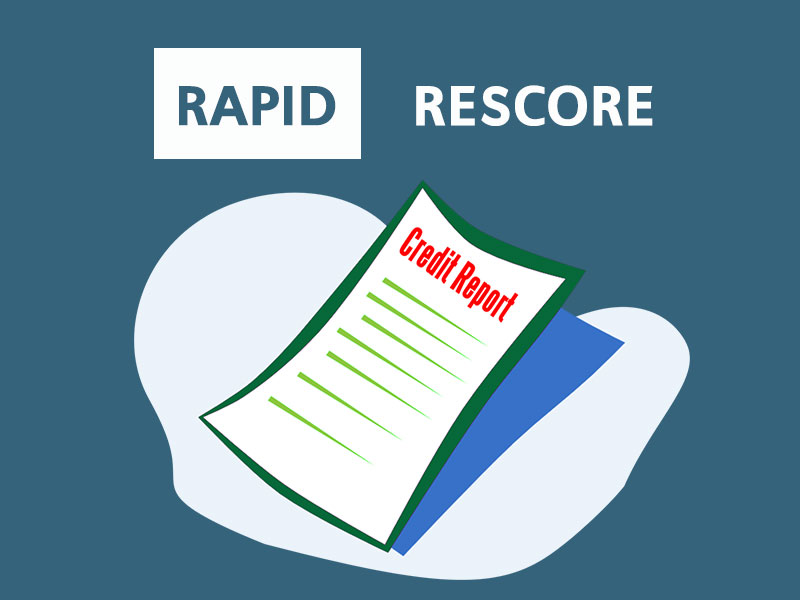
Many people run into credit problems during their lifetimes. Even if you have an ideal credit score at one point, it’s possible to experience unexpected financial challenges that quickly impact your score and cause it to plummet. If you find yourself in this situation, there are tools available to help you restore your credit.
A repaid rescore is one such tool that’s purported to quickly raise your credit score. Does it actually work as advertised? Here are some things you should know about rapid rescores.

Table of Contents
Understanding the Purpose of a Credit Score
A credit score is a number used to assess an individual’s credit risk. Creditors rely on this number to help them determine whether to extend credit to a potential borrower and determine what rates and terms to offer to each applicant.
People with low credit scores generally have a more difficult time buying homes, renting homes or apartments, or getting loans with good interest rates. That is why many people consider the rapid rescore process to help raise their credit.
There are several factors that can influence your credit score. They include:
- Your outstanding loan balances
- Your payment history and number of late or missed payments
- Types of credit accounts you have (such as credit cards, mortgages or car loans)
- The length of your credit history
- The number of credit applications you have submitted
If you have a low credit score, you will have a harder time getting loans. You’ll also be more likely to pay higher interest rates on approved loans than someone with good credit would pay on those same loans unless you take steps to repair your score.
How a Rapid Rescore May Help
A rapid rescore is a technique that may be used to quickly raise your credit score. Traditional methods for restoring and raising your credit score can take weeks or even months to show up on your credit report. With a rapid rescore, lenders quickly correct inaccurate information on a borrower’s credit report and then send the credit report to be re-scored.
This service is usually offered to home buyers whose credit profiles negatively impact their ability to get an affordable mortgage loan.
One scenario when this type of quick credit correction may help is when a potential home buyer wants to pay down enough of their debt to qualify for a more appealing interest rate. The borrower knows that even if they pay down the debt today, it may not show up on their credit report for weeks. By that time, the home may no longer be on the market.
A mortgage lender might use this opportunity to introduce the possibility of a rapid rescore so the borrower can see what hypothetical actions could rapidly bring their credit score up to where it needs to be to qualify for the desired interest rate.
If the numbers look good, the borrower can then agree to take the actions outlined by the mortgage lender to rapidly raise their credit score and thus improve their borrowing power.
Situations When a Rapid Rescore Might Be Beneficial
It may not seem like a big deal to get an interest rate that’s 1% or 2% higher than you hoped to get. In practice, though, just a quarter percentage point difference in your interest rate could end up costing you thousands or even hundreds of thousands of dollars over the life of your loan (depending on what type of loan you’re getting).
If you’re interested in saving as much of your hard-earned money as possible, it’s worth it to try to get the best interest rate available. If you’re applying for any of the following, you may find that a rapid rescore is well worth the effort:
- Credit card
- Mortgage loan
- Any type of credit
In the case of a mortgage loan, your credit score will also help a lender determine how much you need to pay upfront for a down payment. If you have a poor credit score, your down payment requirement will likely be larger.
Consider the following hypothetical situation where a rapid rescore might be beneficial. Imagine you’re trying to buy a $400,000 home. For someone with exceptional credit, the lender may decide to only require a 5% down payment because the payment history and overall credit profile look so good.
If your credit score is lower, though, the lender might require you to put 10% down instead because they are taking a higher risk by approving you.
Though 5% may sound small, it is a huge amount on a $400,000 home. In this scenario, poor credit could require you to pay $20,000 more in a down payment than you would have to pay if your score were more favorable.
Potential Drawbacks of the Rapid Rescore Process
Now that you know more about how to quickly re-score your credit, you’re probably wondering why everyone doesn’t go through this process every time they want to take out a loan. The answer is that the process can backfire in some cases.
Depending on your recent financial decisions, your credit score could actually go down after a rapid rescore. This happens sometimes when borrowers have recently made financial decisions that damage their credit scores. If those decisions haven’t shown up on their credit reports yet, it’s definitely not the time to rapidly rescore their credit and force those decisions to show up right away.
It’s also important to note that a rapid rescore is not magic. It will not mystically transform a bad credit score into a good credit score. For this action to benefit you at all, you need to have made recent positive changes (such as paying down your debt or correcting credit errors) for your score to improve.
Learn More About the Credit Rescore Process
Would you like to learn more about the rapid rescore process or other actionable things you can do to improve your credit score? If you are looking into getting a mortgage or otherwise need better credit, check out the credit repair resources we offer here at Fiscal Tiger.





